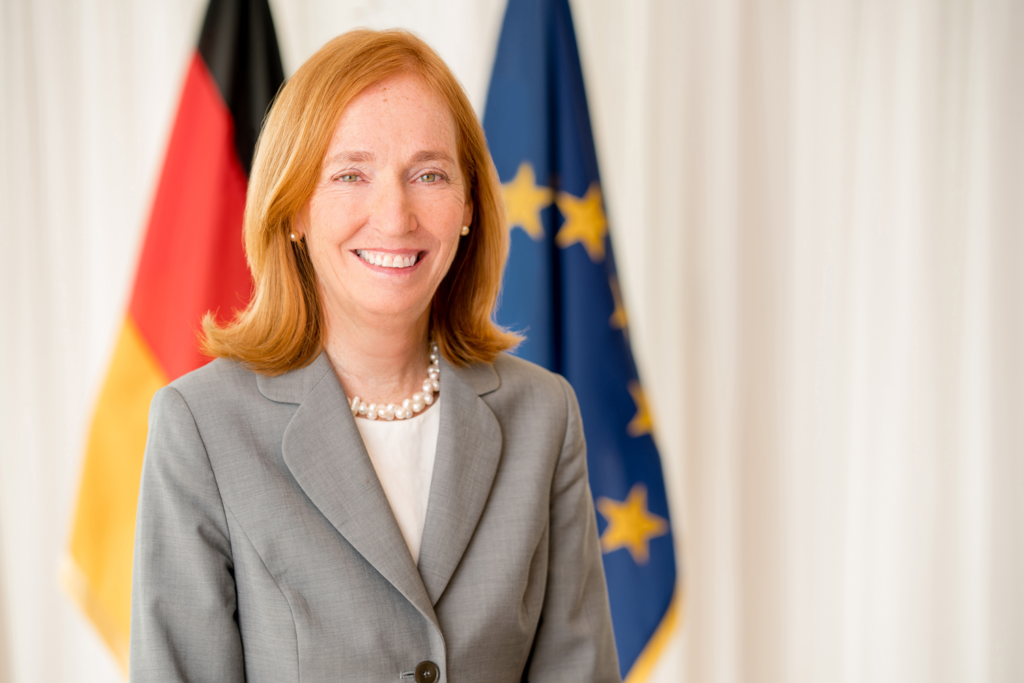
This past Thursday, the John Sloan Dickey Center invited German Ambassador to the U.S. Emily Haber to speak to the Dartmouth community about democracy, diplomacy, and the current American-German relationship. Prior to serving as Ambassador, a position she has held since June 2018, Haber filled a number of other diplomatic posts representing her native Germany at home and abroad, including time serving as State Secretary during the height of the refugee crisis. Haber was interviewed by Daniel Benjamin, director of the Dickey Center, a man who has served in a number of important diplomatic positions himself under the Obama administration.
From the perspective of the average citizen, it can be easy to assume that the relationship between Germany and the United States is strained. A recent PEW research poll found that, in 2018, 70 percent of Americans felt the relationship between Germany and the U.S. was good, while only 24 percent of Germans felt the same way. In light of these findings, many in attendance, including Benjamin, were eager to hear if the relationship was truly as strained as it appeared to be from someone personally invested in it. Haber was quick to note that we tend to “personalize things” when it comes to evaluating bilateral relationships and project the attitudes of the heads of state towards one another onto the countries themselves. Many would agree that our current President has a polarizing personality. However, Haber seemed to suggest that this has little impact on the actual relationship between our two nations; rather, the integrity of our partnership depends much more on a robust underlying structure of agreements and policy.
Haber, when explaining the potential root of disagreement between German and American policy, points not to personalities or politics, but to one fundamental difference: America is a large and powerful country, while Germany, like the rest of the European states, is not. She believes that, because the United States is so self-reliant, it can afford to push for drastic change, while Germany relies on stability to survive. She noted that 40 percent of the German GDP comes from trade, and thus its relationship with other states is its lifeline. Ultimately, the United States can afford to “go it alone…while a country like Germany cannot.” Thus, when it comes to issues like relations with Iran or policies regarding China, Germany is much more likely to act cautiously and preserve the status-quo that America is.
As a result of their cautious stance, it may appear that Germany disagrees with the United States on a number of issues. This, when coupled with statements from important national figures that seem to reflect strained relations (such as German Chancellor Angela Merkel’s comment, “We Europeans truly have to take our fate into our own hands”), may lead to the popular misconception that the United States’ foreign relations are deteriorating. Haber pointed out, however, that we must be conscious of the difference between strategy and tactics. In many instances, German and American strategy is aligned, and ultimately they want the same outcome, though they may disagree on how best to bring about this outcome. For example, when it comes to the Paris Climate Accords or the Iran Nuclear Deal, the U.S., when it noticed problems with the agreements, pulled out of both deals in protest. Germany may likewise take issue with the same elements of the deals that the U.S. does, but takes the more cautious approach of remaining in the deals and hoping to change them from within.
Despite these disagreements, Haber wanted to make clear that Germany recognizes the United States as its most important ally outside of the European Union and wants to respect the concerns of the U.S. wherever possible. For this reason, Germany has recently been increasing its defense spending in response to frequent criticism of various NATO members from President Trump. Additionally, the U.S. and Germany are working closely in countering the explosive rise of China. Haber noted the threat posed to all free states when the most economically powerful country is not a democracy, and therefore wants to pressure China, just as the U.S. does. She stated, “[China] is a competitor. It’s a competitor in all areas where Germany is concerned.” Importantly, this comes with a caveat. “It’s also a partner,” she noted, though not necessarily by choice but by default when it comes to, for example, peacekeeping and the climate crisis.
Benjamin, recognizing its relevance and importance, asked many questions regarding the mounting tensions between the U.S. and Iran. After all, Germany and the United States have split when it comes to dealing with Iran. The U.S., to the dismay of many, pulled out of the JCPOA, while Germany, though desiring for Iran to return to compliance, remains in the deal, despite multiple transgressions by Iran. Benjamin stated he was sympathetic to Germany’s position, and even to Iran, as he felt the United States was the aggressor and is at fault for the mounting tensions. “We pulled the rug out on them,” he said. Haber, on the other hand, saw things differently. Though she regrets the United States’ withdrawal from the deal, she recognizes that Iran was the first to “attack” the JCPOA. Furthermore, regarding President Trump’s decision to kill Iranian General Suleimani, she respects the Administration’s claim to self-defense. “The man [Suleimani] was a terrorist and it’s well-known that he declared war on America,” she said. For now, Germany and the United States remain in disagreement over the appropriate response to Iran, but Haber made clear that, like the United States, Germany “will never accept a nuclear Iran.”

Another major competitor against which Germany and the United States stand together is Russia, who has interfered in the political process of both nations and continues to threaten the stability of Europe by using military force to annex territory. Because of their wide-spread influence and shady practices, and likely because of a reputation that they carry from the Cold War, Russia can seem like a powerful rival. Haber, however, believes this is exactly the perception Russia wants its rivals to have of it. She noted that Russia wants to “preserve the system,” a multilateral structure in which they are “one of the centers.” However, their tactics betray their lack of strength. They resort to infiltration and sowing dissent within the borders of rival states because they are not nearly as powerful or influential as superpowers like the United States or China.
When it comes to bringing nations like Russia in line, Haber is critical about the United States’ tendency to extensively employ sanctions. She believes sanctions are a powerful tool for diplomacy, but if they are overused, they become diluted. She stated, “you start on a downhill road at the end of which the sanctions will not work anymore.” Rather than just punishment, Haber recognizes the value of incentives. “It’s not only about punishing the past, it’s about encouraging the future,” she said. Furthermore, she criticized the tendency for media to sensationalize reports of “fake news,” implying that they worsen the problem by reporting the false information rather than focusing on the source of the lies. She said we must make sure it’s not the “content of the false stories making headlines, but the origins of the stories” in order to combat Russia’s efforts to destabilize our political systems.
Haber, true to what her title might suggest, was very cordial and respectful when referring to points of departure between German policy and American policy, and helped remind all in attendance that, despite what sensational headlines might suggest, Germany and the United States have a very positive relationship. Haber noted Germany’s effort to encourage a good perception of itself within the United States, and vice versa, through a variety of programs. For example, Germany has worked to establish contacts in all fifty states, particularly in the Midwest, an area Germany has historically overlooked diplomatically. Furthermore, she spoke highly of exchange programs between the United States and Germany, as students learning from each other tend to greatly improve relations. These programs help to ensure that German-American relations are not solely reliant on their policies or governments, but are built on a foundation of citizens who genuinely look favorably on the partner nation.
Haber also spoke of her time serving the German government during the refugee crisis. She noted the government did a great job in caring for the enormous number of refugees, ensuring each had a bed to sleep in every night, not a small feat by any means. She also said she learned a number of valuable lessons about democracy during this time. She observed particularly strained relations between the refugees and East Germans, who protested and called for the government to integrate them before migrants, a reference to East Germany’s separation from the West during the Soviet occupation. She noted that, though you might want to help all people in a democracy, when it comes to people’s identities, you cannot enforce change. Identity is something integral to how each individual or group sees itself, and, because we have agreed to a democratic system, we “need to represent if people are uncomfortable about something.” The reaction of German citizens towards the influx of refugees taught Haber that in certain situations, the opinions of the government and the opinions of the people do not align, but if you commit to democracy, the government must respect the opinions of the citizens. Furthermore, a democracy is built from the citizens who make up the state, and thus the government cannot heed to the wishes of those outside its borders if they oppose the wishes of the citizens within. Therefore, this led her to the conclusion that it is not viable to respect the principles of democracy and have open borders.
During the portion of time dedicated to questions from the audience, many expressed concerns about the rise of nations that express undemocratic principles, like Russia and China. One questioner noted that while Haber talked much about the economic threat a powerful Russia or China pose to democratic nations, he felt she did not adequately address the concern that they pose a threat to democracy itself. How are we to combat Russia and China if our very form of government is at stake? Haber encouraged us all to remember that almost all in attendance were fortunate enough to grow up in a democratic state, and it is therefore hard to imagine democracy vanishing. Not all had this upbringing, however. Haber told a very touching story of a woman she had talked to who grew up in East Germany under Soviet rule and believed as a young girl that the Berlin wall would never fall and she would never experience the freedom of a democratic nation. For those who have felt the shadow of tyranny, democracy is not a given, and the threat of it vanishing again is much more real. Haber recommends we learn from their perspective and always remember democracy is not a given. As she memorably put it, “we cannot take anything for granted.”

Be the first to comment on "German Ambassador Lauds Bilateral Relations, Democracy at Dartmouth"